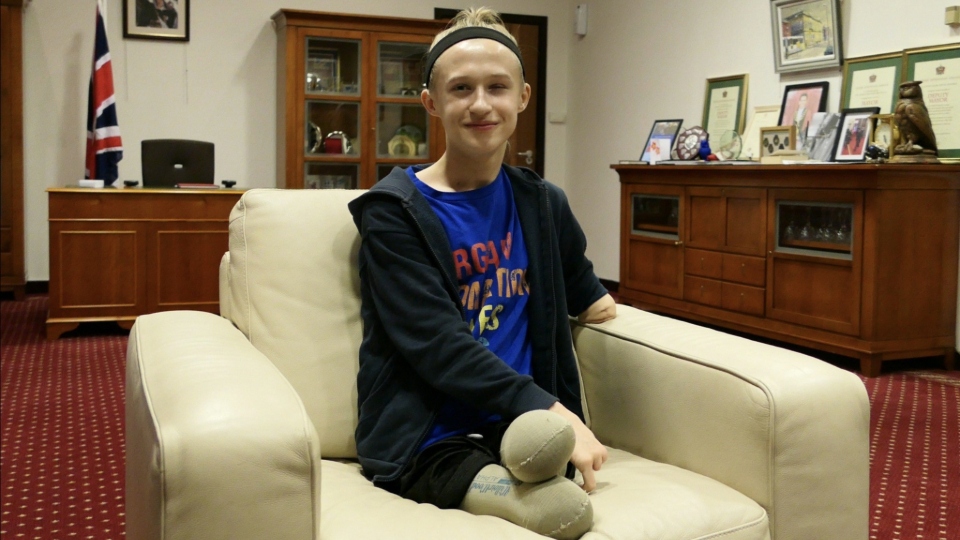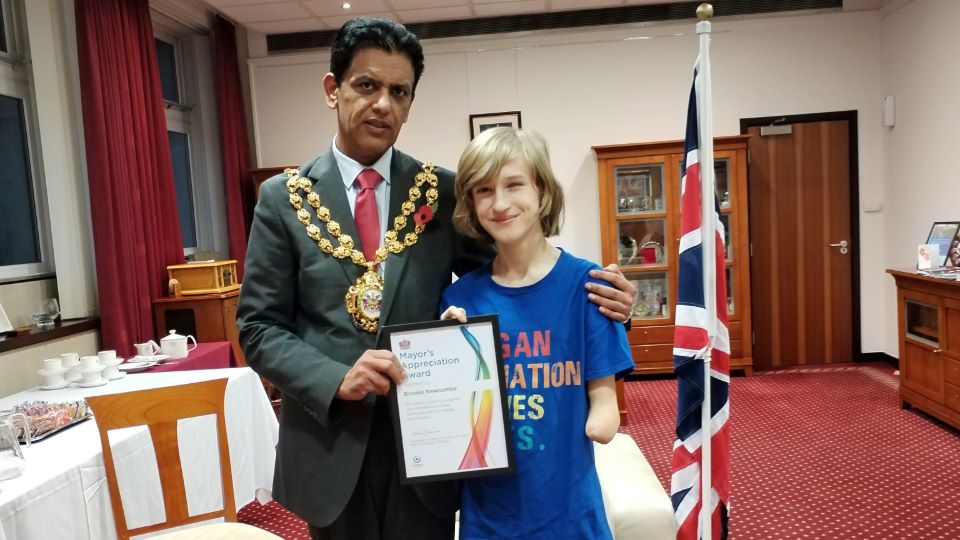‘They’d never seen someone with such a catastrophic illness’
Reporter: Charlotte Hall, Local Democracy Reporter
Date published: 03 February 2025

Brooke Newcombe, pictured in the mayor's chambers. Image courtesy of Charlotte Hall
When Brooke Newcombe, 10, collapsed on the stairs at his family home in Oldham, his mother had no idea what was wrong.
She rushed him to hospital, where he was diagnosed with the flu.
Within just a few hours, Brooke was left fighting for his life.
All of his organs failed, he suffered a cardiac arrest, and doctors had to put the ten-year-old into an induced coma in the hopes of saving his life.
“Nurses told me they didn’t think Brooke was going to make it,” Brooke’s mum Susan told the Local Democracy Reporting Service.
“They’d never seen someone with such a catastrophic illness.”
Brooke had sepsis, the life-threatening condition happens when the immune system overreacts to an infection and starts to attack its own tissue and organs.
Sepsis affects around 240,000 people in the UK – more people than have heart attacks each year – and claims around 48,000 lives each year, according to the UK Sepsis Trust.
Yet while most people can recognise the symptoms of a heart attack, sepsis can often be harder to spot – and can become a ‘silent killer’ if not recognised quickly enough.
Doctors managed to save Brooke’s life.
But it came with a big change for him and his family.
The youngster had both legs amputated from the knee down, along with part of his left arm and four of his right fingers.
Now 15, Brooke and his mum are sharing his story to spread awareness about the condition.
“It’s a very overlooked disease. And I think it’s very dangerous that people underestimate it,” Brooke, now 15, told the LDRS.
“But if you act quickly, it gives people a better chance of surviving.
"I don’t want anyone else going through what I went through.
"My goal is not to stop until everybody knows what sepsis is.”
Brooke recently took to the stage at an Oldham Council meeting and has been sharing parts of his activism on social media.
The LDRS first met him in the mayoral office in Oldham’s Civic Centre, where he had commandeered Mayor Zahid Chauhan’s chair.
“I might be coming for your job next, too,” he joked to the mayor, in a bright voice.
Brooke doesn’t remember much about what happened while he was in hospital, he told the LDRS.
“It was all very fast moving and confusing.
"I didn’t really know what was going on at the time because it was all going haywire in my mind.
“I remember waking up from the coma, but I was very confused.
"It took me some weeks to figure out where I was.
"I was incapacitated and on a lot of medication.
"All I knew is that I was in hospital and that was really scary.”
His mum agreed it was difficult for the family to remember exactly what happened.
Susan said: “There’s months that are just a blur of hospitals, nurses, medicines, everybody throwing information at you.
“Within the first 48 hours, the hospital said: ‘if Brooke survives, we’re going to have to amputate’.
"He’s got sepsis, gangrene and he had blood poisoning, blood blisters all over his legs.
“His arms and legs were black – his whole body was turning black overnight.
"He looked like a battered doll, he was so swollen and bruised. It was terrifying.”
Three days after Brooke was checked into hospital, Susan received a call from the night nurse.
She was to come straight away – Brooke was having a cardiac arrest.
“They told me ‘we think this might be it’. I just thought: Oh no you don’t. No, no, no you don’t.
"I really had to beg God that night.
“I arrived and there were these two nurses pumping on his chest – and he’s so little, he’s so tiny.

"I will never get that image out of my head. That’s not something you forget.
“And to think he came out of that… It was a miracle.
"People have said that: That he’s a miracle child. That he shouldn’t be alive with everything he’s been through, medically.”
At first Brooke’s medical treatment focussed on simply keeping the boy alive.
But as he started to stabilise and doctors started to bring him out of the induced coma, decisions had to be made about the extensive damage the sepsis has done to his extremities.
Brooke says he remembers being involved in the conversations, but that he was on ‘so much medication, I needed a lot of support from my family’.
Susan recalls the moment she had to make the ‘really, really horrible decision’.
“He had septic shock – the sepsis had basically eaten through his muscles,” she explained.
“They told me they’d have to go through the knee.
"I was sitting there contemplating him having his legs amputated, when just a few weeks ago he’d been running around the park.”
Brooke said he knew as soon as the operation was over he’d have to ‘adapt to survive’.
“I pulled in every resource that I could,” he said.
“I leaned on my family a lot, especially my mum.
“I didn’t want everything that was happening in that hospital to be the end of my journey in life.
"I wanted to have things. I wanted to do things and have more experiences in my life.
"I didn’t want that to just be it and be in a chair for the rest of my life.
"I was determined from that day onwards that I would get better, I would get back to my life.”
But the recovery process was not easy.
Brooke remained in hospital for ten months and continued needing dialysis for eighteen months.
“I did have some days where I thought, am I going to make it through this?” Brooke said.
One major turning point for the teenager was when he received an organ donation in 2021.
The kidney transplant ‘changed his life’.
“It was like a second chance. I was free from dialysis, from constantly being tired.
"I could finally go back to school full time.
“I really want to spread awareness about transplants because I think people need to be more open about talking about it.
"It can be a touchy subject, but they can make such a huge difference.”
Now Brooke is doing just that.
He says he wants to stand on ‘many more stages’ and inform people of all ages about the first signs of Sepsis.
These include six key symptoms: slurred speech or confusion, muscle or joint pain, passing no urine for a day, severe breathlessness and skin that’s mottled, discoloured or very pale, and ‘feeling like you’re going to die’.
Dr Ron Daniels, an NHS intensive care doctor and founder of the UK Sepsis Trust said: “Sepsis is one of our most life-threatening medical emergencies.
"About 96 percent of the public have heard about sepsis – but they don’t know that much about it.
“Trust your instinct.
"If you or someone you love is getting worse with an infection, go to 111 or make an appointment to see the GP that same day and ask: could it be sepsis?
"But if you something seems very badly wrong, and you experience any of those six symptoms, go straight to A&E – not tomorrow, right now.”
He added that loss of limbs and digits affects between one and five percent of people who survive sepsis.
But other after-affects can include fatigue, brain fog and PTSD.
Do you have a story for us? Want to tell us about something going on in and around Oldham? Let us know by emailing news@oldham-chronicle.co.uk , calling our Oldham-based newsroom on 0161 633 2121 , tweeting us @oldhamchronicle or messaging us through our Facebook page. All contact will be treated in confidence.




